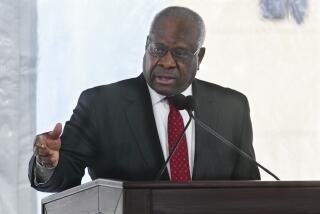Wily Answers May Not Be High Crimes
- Share via
There was a man who swore to tell the truth, the whole truth and nothing but the truth. In spite of this, he had secrets to hide. He decided on a strategy: He would, when questioned, not say anything that wasn’t literally true, but he would not be helpful in revealing the whole truth.
So, when he was asked a question about matters he wanted to keep secret, he gave an answer that was, based on the verb tense in the question, literally true. He knew what he was doing. He knew what his questioners really wanted to know, but he wasn’t going to help them.
Sometimes his questioners detected his strategy and asked more penetrating questions to try to reveal his secrets. He stuck with his overall strategy: Tell the literal truth. So, when asked about personal matters (“Did you do this or that?”), he replied in a manner that did not reflect on his own behavior (“Some other people did.”).
Our man knew how this answer would be understood in casual conversation. By saying, “Others did,” it would be assumed that he didn’t. This was his strategy.
He wasn’t about to tell his questioners that he was shrewdly calculating his answers in an attempt to conceal his secrets. Was he being evasive? Of course. Was he unresponsive? Definitely. Could anyone doubt that his strategy was to give answers that were meant to derail the questioners?
His questioners had a name for this kind of slick witness: wily.
The man? One Samuel Bronston. The year? 1966. The circumstances? A bankruptcy proceeding in federal court resulting in a perjury conviction, which was predicated on Bronston misleading his questioners. But the case didn’t end there. Bronston appealed his case to the U.S. Supreme Court, which issued its decision in 1973.
For the Supreme Court, it wasn’t even a close call. Justices overruled the perjury conviction. Chief Justice Warren Burger, writing for a unanimous court, explained that as long as a witness gives answers that are literally true, he cannot be convicted of perjury. The government cannot base a perjury conviction on a witness who is unresponsive, evasive, reluctant to answer, seeking to conceal, trying to sidetrack his questioners or shrewdly calculating how to answer questions so as to evade revealing information that the witness finds embarrassing.
What philosophical approach did the court take toward perjury? Where, in our legal system, does responsibility ultimately lie for providing the truth, the whole truth and nothing but the truth?
The court reasoned: “It is the responsibility of the lawyer to probe. Testimonial interrogation . . . is a probing, prying, pressing form of inquiry. If a witness evades, it is the lawyer’s responsibility to recognize the evasion and to bring the witness back to the mark, to flush out the whole truth with the tools of adversary examination.”
The court’s decision has not been overruled.


